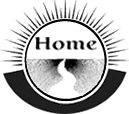I saw Nucleus at The Electric Circus in 1968, in Toronto, and they blew my mind.
They may have been opening for someone, but I can’t remember who, because they were that good. All I remember is a fire breathing behemoth of sound coming from the stage. A churning organ, thunderous bass, and furious guitar lines were built upon intricate but tasteful drumming. The drummer was Danny Taylor.
Danny was an adolescent pop star with a band called The Lords of London, who scored a top ten Canadian single in the mid 60’s with “Cornflakes and Ice Cream”. The Lords soon morphed into Nucleus, who, although releasing only one album, became a ground-breaking tour de force on the Canadian music scene in the late 60’s. With a couple of line-up changes, and a more commercial but still heavy sound, the band became A Foot In Coldwater, scoring another hit in the early ‘70’s with “Make Me Do Anything You Want”. The following is a recent interview I did with Danny Taylor. Enjoy!
Terrascope: Danny, how did you get into music?
Danny Taylor: Well, originally, I was a singer with a band called The Corals. I played harmonica, sax and a little bit of guitar.
T: OK, and as I understand it, Sebastian Agnello, John Richardson and you went to the same high school in Toronto, and decided to form a new band. John played pedal steel, and Sebastian played guitar, and you switched to drums?
DT: Yeah, I figured, how hard could it be…hahaha…
T: So that was the beginning of “DT and The Phantoms”?
DT: Right.
T: You played a “Battle of The Bands” at your school, an lost to a band called “The Mysterions” who won the $25.00 prize.
DT: That’s right! Was it $25?!
T: So, I’ve heard.
DT: I’ll have to ask Greg about that, I thought it was ten bucks….hahaha.
T: You’re talking about Greg Fitzpatrick?
DT: Yeah, Greg was the guitar player in that band. After they won, we asked him if he wanted to play with us, on bass, because we didn’t have a bass player. And he agreed!
T: So, that was the beginning of “The Lords of London”?
DT: Yes. We also got Hughie Leggat from a band called The Undertakers, who took over on bass. Greg went back to guitar and Seb switched from guitar to Farfisa organ.
T: What kind of music were you playing at the time?
DT: Well, we had the Farfisa organ, so we were doing “99 tears” and some soul stuff.
T: And you were now writing your own stuff?
DT: Yeah, we were all writing. But Greg came up with the first singles.
T: “Cornflakes and Ice Cream” was a huge hit in Toronto in 1966. What did that feel like to you? You must’ve been 15 years old.
DT: Yeah, it was weird. I’d be walking down the hall in school, and these girls would have our pictures in their lockers.
T: You were rock stars at about 15 years old.
DT: Yeah, and although “Cornflakes” was pure pop, we started writing more serious things shortly after.
T: I know. I understand you didn’t want to release the next one, “Popcorn Man” because it was too close….
DT: Yes, we didn’t want to be just a pop band.
T: Right, there were some great other great songs you guys released that were much more adventurous, like “Time Waits For No One”, “21,000 Dreams”, “Candy Rainbow” and “Within Your Mind”.
DT: Yeah, Candy Rainbow and Within Your Mind were the beginnings of new sound.
T: And the beginning of Nucleus?
DT: Not yet.
T: “Within Your Mind” was quite psychedelic. They were all released on Apex records, right?
DT: Yes, it was the beginning of the change.
T: Did you know there was another “Lords of London” band from Colorado?
DT: What?!
T: Yeah, they were around about the same time….1966, with a tune called “Cowboy” and some others on Domain Records.
DT: I did not know that. Weird.
T: So, then what?
DT: Well, the whole record thing was to be successful, right? And to do that, you need radio play, and we weren’t getting it, even though we were very close to being on Shindig and The Ed Sullivan Show.
T: So, what happened?
DT: Well, we were supposed to record “Be My Baby”, by the Ronettes, at A & R Studios in New York, but the vocal was out of Greg’s range and Hughie had strep throat, so we couldn’t do it. We were all upset, especially Seb, who left the band.
T: That’s too bad. So, Bob Horne replaced Seb on keys?
DT: Yes. He was a great player…a real greaseball, too.
T: A greaseball?
DT: Yeah, a greaser, but we called him “a hippie”, which was as far as the truth as you can imagine. He was into motorcycles and all that stuff.
T: Right, there’s some yelling at the beginning of The Nucleus lp that mentions “a dirty hippie”.
DT: Yeah, that’s about Bob.
T: So, Bob replaced Sebastian on keys…
DT: Yes, but when Bob replaced Seb, he played a B3. And we weren’t into it, at first. But it later became a big part of our sound. “Lost and Found”, “Dead or Alive”…those were all Greg’s songs, but with Bob’s heavy organ sound. In the meantime, I had been studying Gene Krupa, and all those guys, and I wanted to do something else.
T: Getting back to the latter stages of The Lords, where did you guys record?
DT: The early tracks were recorded at RCA Studios in Toronto, and the later ones at A & R Studios in New York.
T: So, you got a recording deal in when you were 15 years old in New York?
DT: Well, we had a couple of deals going on ….MGM….and Decca…I can’t recall. But the original deal was for “Cornflakes and Ice-cream” to be on the A side, and “Time Waits” on B. Things got screwed up and the sides were reversed.
T: But, “Cornflakes” still became a hit record.
DT: Yeah, it was crazy. There was a magazine called “Canadian Teen”, and we were in there all the time. Girls had my picture on their locker room wall. We were still in high school. I was thinking, please don’t the burst the bubble, because it’s too good! Hahaha.
T: So, what happened next?
DT: Basically, the radio stations weren’t playing our tunes after “Cornflakes”, so we started developing a new style. I called it “Mau Mau”.
T: What is that?
DT: Funk…jungle rock. That was our new sound. That’s when I was doing all these Buddy Rich things, syncopation, you know. A song called “Requiem” was the beginning of the change. I was laying down all these different time signatures, and the guys were saying, ‘wait a second here…what are you doing?!’
T: Right.
DT: So, that was really the beginning of the “Nucleus” sound. There became more to the songs than Greg’s writing. John Richardson was just developing a new style, and Bob was becoming a real monster on keys.
T: You know, I saw Nucleus at the Electric Circus around 1968, and you really blew me away. Who were you guys influenced by? I heard elements of Hendrix, Vanilla Fudge...it was one of the heaviest thing I’d ever heard.
DT: You know, it was an honour to be part of that. We knew that there was a lot of talent, but we didn’t know wh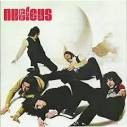 ere it was going to go. ere it was going to go.
T: You guys released the lp, “Nucleus” on Mainstream records, in New York?
DT: Yeah, we recorded it at A & R Studios in New York. We just played it live off the floor. It was so heavy, man. I wanted to play in different time signatures, like 5/4, and some of the guys were saying “what?” We just looked at each other. Did we just do that? Bob came up the most amazing keyboard parts. John Richardson, too. It was like “What was that!?” But it worked.
T: “Screamin’ J.R”! You can hear Greg yelling that about John during the intro of the lp. It’s monster album, man.
DT: Right. And then we went on the road, which was tough. Nucleus was big in New York, and pockets of the American west, oddly enough. But, we couldn’t keep on sustaining ourselves on the road especially in Canada. Toronto, Winnipeg, Lethbridge, Calgary, Vancouver, Victoria, and of course all over southern Ontario. We played all those towns, but they are so far apart. It was hard.
T: Well, you guys were great. Your one and only lp, “Nucleus” got a lot of air play on the underground radio stations in Toronto…
DT: And in New York. We played the Electric Circus, there, too. That’s when I used two different size bass drums…a 26” and a 22”. It gave it a different tonal thing. I used Slingerland drums, like Buddy Rich.
T: You were supposed to play the Whiskey a Go-Go in Los Angeles. Why didn’t that happen?
DT: JR was going though some personal problems so that didn’t happen, unfortunately.
T: You guys recorded the lp, “Nucleus” in 1968, but it didn’t come out until 1969. Why did it take so long?
DT: There were several things. Greg wasn’t doing too well. He had an illness, and we couldn’t really go on without him. Although we did play at The Toronto Rock and Roll Festival in ’69, with Hughie taking the vocals.
T: That’s the festival with John and Yoko, Chuck Berry, Little Richard, Alice Cooper…
DT: Yeah, and with Hughie on bass and me on drums, we backed Chuck Berry.
T: Amazing.
DT: Yeah, and the trade papers were comparing us to The Doors, which Hughie loved, because he loved Jim Morrison. But we were nothing like The Doors.
T: Right.
DT: Getting back to the recording of the album, Phil Ramone was one of the engineers, and he couldn’t believe what we were doing, at such a young age. We were playing live off the floor, one or two takes, that was it. I remember Grady Tate coming in …you know Grady?
T: Sure, jazz drummer, and singer.
DT: Right, we came back into the booth after the second take, and Grady was there. He said “Yeah, man, nice left hand”. I said, “Thanks”, but I really didn’t know who he was….hahaha.
T: Yeah.
DT: Well, I was 18 years old! One of the other engineers told me, “you know who that was”?! Grady Tate!
T: There’s a ‘Vagabonds’ patch on the back of the Nucleus album. Those guys were heavy bikers. What’s that about?
DT: Hughie’s brother, who was part of the crew, was a ‘Vag’, and Bob Horne was sort of in and out. So, we had to make a choice whether he was with them or he was with us. We all got into bikes eventually, but we weren’t really into what they were all about, if you know what I mean.
T: Yeah, I sure do.
DT: They used to follow us around like crazy. And sometimes it was good, and sometimes it was bad….and when it was bad, it would bring down the heat.
T: That couldn’t have been good.
DT: No, but most of the audience were the university crowd. Our last gig for instance, was at The University of Toronto. People wouldn’t let us off the stage. I remember it like yesterday. Everybody was crying…the band and the audience, too. I wish that band was still together. But there were things going on that weren’t sitting well with everyone.
T: And I guess the record didn’t sell that well.
DT: No, but it became a cult record. And it didn’t give us the monetary return, which affected Greg, since he wrote all the songs. That was a bone of contention, because, although he wrote them, we arranged them as a band. And after that, it just wasn’t the same.
T: Tell me about the El Patio gig in Yorkville. Nucleus were like the house band at that place in the late ‘60’s. What was that like?
DT: Yeah, there were a lot of musicians there. The club used to charge 50 cents for a coke, and if you didn’t have another coke, they’d kick you out. So, we’d have a different audience every set.
T: OK, was it the case that if the Nucleus album had done well, then you guys would have stuck together?
DT: No, probably not. There were too may issues. John and Greg couldn’t have worked together. We continued for a short period of time and did some things with Cathy Young, the singer. It was interesting, but not fulfilling.
T: So, you, Hughie and Bob started auditioning people at your place?
DT: Yeah. That didn’t work out, but Cathy suggested the singer and guitar player for a band called “Leather”, who were just breaking up.
T: Alex Machin and Paul Naumann.
DT: Yes, I wanted someone with a unique style. I think I had a style. My favourite players back then were Mitch, Ginger, Whitey Glan, Buddy Rich, Gene Krupa, BJ Wilson, from Procol Harum, Jim Fox from The James Gang.….so I wanted someone with their unique style, too.
T: And Alex and Paul fit the bill.
DT: Alex was the only singer we tried out who could sing the really high notes in E major, a key we always played in…hahaha! And Paul was a guy who could ‘sing’ on guitar. With those guys, we thought we had found the magic….and I think we did.
T: So, that was the beginning of “A Foot In Cold Water”.
DT: Right. The first guy who heard us was Johnny Mitchell on Chum radio in Toronto. He was the manager of Grand Funk at one time. He turned manager and Daffodil record company owner, Frank Davies onto us.
T: Frank named you guys “A Foot In Cold Water”. What does it mean?
DT: It’s an old English saying that ‘if you get your foot in cold water…you’re in a lot a trouble’….hahaha.
T: Right. 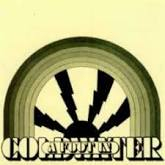
DT: Paul Weldon, from the band, ‘Edward Bear’, did the original logo for the band, which was cool, I think.
T: Very cool.
DT: Anyway, we were doing sort of a Nucleus thing at first. But, we knew it had to become more melodic, and commercial.
T: So, you co-wrote your hit record, “Make Me Do Anything You Want”. How did that come about?
DT: I had a song called “Morning Rain”, and couldn’t figure out what to do with it. Hughie and I had written it. I had these lyrics, but I didn’t know what to do with them. It was a bit like “Spooky”, by the Classics Four. So, Hughie said “you can’t use that, it’s been done”.
T: Right.
DT: So, Paul was playing guitar around with a lick in D modal, and I said, “wait a minute, what did you just play”? He played it again, and then I just started singing “In the morning light…feels so good by me.” That’s how it began.
T: That’s the tune. Did you know you had a hit record at that point?
DT: No, not yet, but I was hoping. Because at that point, I was doing a lot of rationalising. I was looking for guidance. I was actually praying! ‘God, what do you want from me? Let me know’.
T: Danny, are you a religious man?
DT: I didn’t think so, but I’ve had religious experiences. I’ve had a near death situation. It made me think twice about my mortality. And, when you do, you think twice about things.
T: So, “Make me do Anything You Want” was your plea to God for help?
DT: Well, I was thinking about leaving the band and I needed some guidance. I didn’t want the song to be about just anything, like a guy and a girl or something like that.
T: Although, that’s what most people would have thought when they heard it.
DT: That’s ok too, but it wasn’t what I was originally writing about.
T: OK, how about that great bass lick of Hughie’s?
DT: OK, this is how creative this guy is. We’d hit a wall after the first verse and chorus, and didn’t know where to go from there. Suddenly, Hughie starts playing this lick on bass…just practicing something. And I said, “Wait a minute, play that again”. So, he did. I said “That’s it. It’s a round…That’s a round!” And then the song took a life of its own.
T: Amazing. And what about Paul’s guitar solo…it’s a classic.
DT: Yes, we were in Manta Studio in Toronto, and had a great engineer, Lee De Carlo, who had worked with The Ramones and all these people. So, Paul was working on his solo, and after a while Lee said, ‘Take a break’. So, we went off for dinner. When we came back, Lee had a razor blade in his hand.
T: Uh oh….
DT: No, he knew what he was doing. He spliced the tape, and bounced Paul’s best take into it’s place. And it sounded fantastic. But, Paul, being the perfectionist that he was, played it again…and better, all in one take.
T: It’s a great solo.
DT: Yeah, but the song didn’t get any airplay.
T: What? I heard it lots of times on CHUM radio in Toronto around 1972.
DT: And in CKLW in Detroit/Windsor. But it was mostly on FM. It was considered too long for AM radio at the time. So,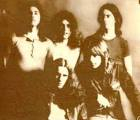 we went down to Electra/ Asylum in the States, and they signed us to a deal to re record a shorter version. we went down to Electra/ Asylum in the States, and they signed us to a deal to re record a shorter version.
T: Great.
DT: Not that great, because in the meantime, we found out later that Frank Davies was trying to sell his whole catalogue on “Daffodil Records”, which included Crowbar, King Biscuit Boy, and all those guys, on the back of our single.
T: What a drag. Just going back, a bit. Could you tell me if the first ‘Foot’ lp was released anywhere else but Canada?
DT: The first lp was only released in Canada. The third album was released in England and the USA. Yeah, that was the American-ized version, as we call it, with the cut down tracks. It was targeted for AM radio.
T: On your second lp, “A Second Foot”, the song “In My Life” is a real stand out for me.
DT: It was actually a bigger hit than “Anything You Want”, worldwide. It was released on Island Records in the UK.
T: Nice.
DT: Yeah, but we also had some issues with the record companies at the time. We refused to do some tracks on the second album. And some of them weren’t produced properly. Like the bagpipes on “So Long”. It was just supposed to be a rough mix, and they released it. We weren’t too happy about that. There was a lot of anger with the record company at that time.
T: Just as an aside, who is the girl on the front cover of “The Second Foot”? It’s an amazing photo.
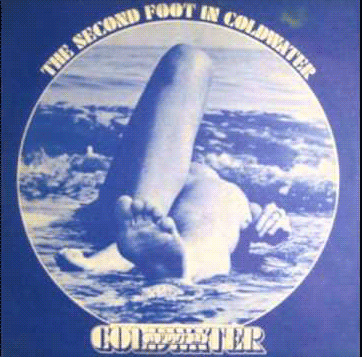 DT: I don’t know. It was shot at Lake Ontario, and I’m sure the girl was freezing her tits off. It was April in Canada….cold! DT: I don’t know. It was shot at Lake Ontario, and I’m sure the girl was freezing her tits off. It was April in Canada….cold!
T: Did that lp do as well as the first?
DT: No. Not at all. Because the single “In My Life” was release first, there was no album to back it up. It was a dispute that we were having with the record company.
T: There always is.
DT: Yeah, so “In My Life” had no legs to stand on. They released “Love Is Coming”, (Hughie’s tune), without an lp to release or promote. It was just too long between albums. We lost the momentum.
T: What about “Yalla Yae”….I love that tune.
DT: Do you? You know, some of my favourite songs were “Deep Freeze”, “In Heat”, “Alone Together”, “Love is Coming”, “Fallen Man”, which is all about the Vietnam War. And “Coming is Love”…we slowed the bass drum down and then played it at double speed on that track. Listen to it. It hits you in the chest. Paul wrote that as a kick in response to “Love is Coming”.
T: Oh?
DT: He said, “That’s emotional love…this is raw love!”
T: Yeah, that’s what it sounds like.
DT: We opened the Calgary Stampede one year, with that tune, and promptly blew up the PA.
T: Love it! Besides Canada and the USA, did you play live anywhere else?
DT: No, but Alex and Paul did overdubs at Trident Studio in London.
T: Then your old record company, Daffodil, released your next single, “Midnight Lady”, and promptly went bankrupt.
DT: Hahaha. I don’t really know what happened. They were having a hard time. That tune ended up on our fourth album, which we did at Sounds Interchange in Toronto.
T: I like that album for the space…without the keys.
DT: Yeah, there were a lot of things that we did without keys, live, that are not on record, like “California”, What’s Mine Is Yours”, “Slip Stream”….
T: Love to hear those tunes, sometime.
DT: When we were doing the fourth album, we just started putting bed tracks down, and then SRO came in and wanted to release it. We didn’t know if it was good enough to put out.
T: But they put it out anyway?
DT: Yeah. We were j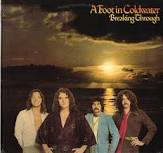 ust trying to define ourselves. It was like, ok, are we the Lords, Nucleus, Foot? We didn’t know. But tunes like “Night’s Still Young”, and “Save It All For Me” are great rock songs which leads back to The Lords Of London. Those songs are straight ahead rock. That was Hughie’s thing, and Paul didn’t get it, and really couldn’t play it. Paul was a great guitar player, but he didn’t get straight ahead rock. ust trying to define ourselves. It was like, ok, are we the Lords, Nucleus, Foot? We didn’t know. But tunes like “Night’s Still Young”, and “Save It All For Me” are great rock songs which leads back to The Lords Of London. Those songs are straight ahead rock. That was Hughie’s thing, and Paul didn’t get it, and really couldn’t play it. Paul was a great guitar player, but he didn’t get straight ahead rock.
T: Why did Bob Horne leave in the first place?
DT: Well, when we were with with Electra Records, they wanted us to be the next Doors. A new young executive came up an asked, “Are you Led Zeppelin or The Eagles”? We said who are the hell are “The Eagles”?
T: Right…I’m still wondering.
DT: He said, “They just backed Linda Ronstadt, which is coming out on my new record label…. Asylum. My name is David”.
T: David?
DT: David Geffen.
T: Oh my.
DT: We said, why would we go with you when you didn’t even sign the band? So, we turned him down. He said, “Well, if you don’t go with me, I’m going to bury you.”
T: Bury you?!?
DT: And he did.
T: How?
DT: He buried Electra, and Asylum, until it became Geffen Records.
T: Yeah, Neil Young had problems with David Geffen, too.
DT: Right, when David tried to give us this shit, Bob Horne jumped over the desk and grabbed him by the scruff of the neck …yelling “You can’t bury us!” Frank Davies, from our record company in Canada, [Daffodil], had to hold Bob back from killing the guy.
T: Wow.
DT: Yeah, and we had a record coming out. And of course, there was no push from the record company and zero promotion. And, they put a terrible picture of us on the back cover, on purpose.
T: That wa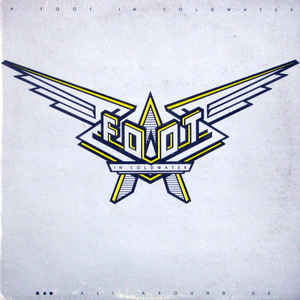 s the lp, “All Around Us”, right? s the lp, “All Around Us”, right?
DT: Yes. We liked the ‘wings’ on the front cover, but the picture on the back was a ridiculous. It was a joke. We hated it! Geffen had to release it, but that’s all he did. That’s at a time in my life during which I was most depressed.
T: I’m sorry to hear that. Did that lead to the end of the band?
DT: Well, Bob Horne left shortly after, for obvious reasons. When we did our fourth album, SRO was very keen on the band, but Michael Cohl (who was our manager at the time), hated SRO. They were adversaries.
T: Michael Cohl…..the future Rolling Stones promoter….
DT: Right. Michael did not want anything to do with SRO. But, our attorney advised us to sign with SRO, and therefore leave Michael and his company, (Concert Productions International), which was a very unfortunate move. We were also supposed to tour with Rush, who were just breaking out in the States. It’s funny because, a year before that, Rush were opening for us!
T: Better that way.
DT: Hahaha. Here’s a funny thing. You talk about ‘politics’…here’s a side note to all of this. Michael Cohl and Bill Ballard would not let ‘Rush’ play Maple Leaf Gardens. [The largest venue in Toronto at the time].
T: Why?
DT: They didn’t like them, and they didn’t like Ray Daniels {SRO}. And so, in large part, they forced ‘Rush’ into the United States, because they couldn’t break them in Toronto
T: Amazing.
DT: Well, what we think happened was a power play between Michel Cohl and Ray Daniels, and as soon as they got us away from Michael Cohl, they did essentially the same thing as Geffen. They detonated us.
T: How?
DT: There are so many things you have control over, as a musician. And there are so many things you don’t. Part of the learning process is dealing with the things you don’t, without killing yourself.
T: Yeah.
DT: And unfortunately, Paul couldn’t deal with that. So, after Bob, he was the next causality. He left to play with “Foreigner.” We didn’t leave on the best of terms, but he was my brother at arms.
T: Let’s talk about Hughie’s band, “Leggat”. You recorded “Illuminations” with him…a double lp. That’s a heavy album, man.
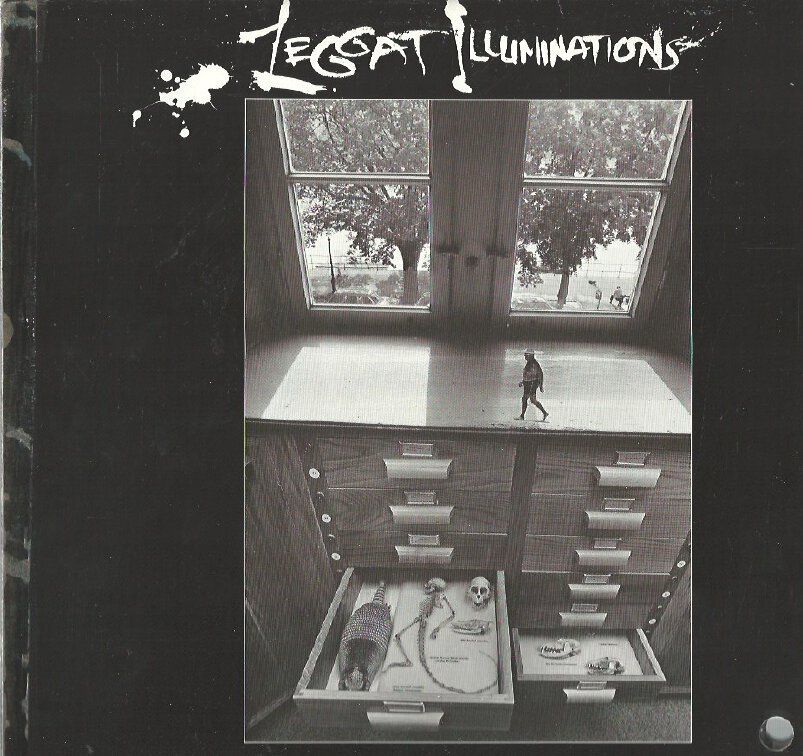
DT: Yeah, that was fun. I also did the demos for Hughie’s other band, “Private Eye”. But, by that point I had enough.
T: Oh?
DT: Too many times with the circus left me bitter and angry. And I had a wife that loved me, and a new born son. And I did not want to tour. Ian Thomas, Chilliwack, and a few other people all asked me to play with them. Even Fleetwood Mac wanted me, at a time when Mick Fleetwood didn’t want to play drums anymore.
T: You turned Fleetwood Mac down?
DT: Well, The Fleetwood gig, I might have taken. Hahaha. But our manager, Michael Cohl, said I was ‘untouchable”. I was under contract, so I couldn’t play.
T: That’s a drag.
DT: Yeah. So, I did a lot of session work, and worked with Gus Papas, Cathy Young, and BB Gabor, but I wouldn’t tour. That kept me from going insane.
T: I hear you’re playing with Hughie Leggat and Alex Machin again.
DT: Yeah. We started when Alex came back from California, and Hughie was in and out of Nashville. We had all gone separate ways, and I had become a mercenary.
T: A mercenary?
DT: Yeah, I was completely out of the business. Alex was doing a lot of record company writing down in L.A. And Hughie was writing with Frank Davies. He did a lot of country and some of his stuff was picked up by The Blue Oyster Cult. Hughie’s a prolific song writer. So, when we were originally asked to get together it was after the 9/11 disaster. Greg Godovitz from the band “Goddo” phoned and asked us if we could do this benefit. So, we brought in Rick Lamb on keyboards, and Dave{Appleby?} on guitar. We put together a couple of songs and played. Before we did that, we’d gotten together with Paul Naumann and played The Diamond Club in Toronto.
T: I remember that gig. That was in 1988.
DT: Yes. And we could have done very well after that, but I wasn’t ready for a full-time commitment with the band. Paul was still ‘using’, and I couldn’t trust where I was going with him.
T: I see.
DT: And I don’t think anyone one else was comfortable with it either. We did a couple of sessions, but it didn’t pan out.
T: What’s the end game with you, Hughie and Alex playing again?
DT: The end game is that we enjoy each other’s company, and enjoy playing together.
T: That’s great.
DT: Yeah. Someone brings a song in, and we play. Hughie’s got this great thing that we’ve been working on, and who knows…we might record it. Alex has got some songs, too. We’ve also been playing “Little Sister”, the old Elvis Presley song.
T: That’s a great tune.
DT: We play My Generation with a segue into ‘Whole Lotta Love’, ‘See See Rider, and ‘Long Train Rolling’ by Jeff Beck. You know, some of the stuff we did as teenagers. It’s fun, man.
T: So, are you going to put some of this stuff on line or for sale at all?
DT: We don’t know. Some of our records are out again on high tech vinyl these days.
T: Yeah, I’ve got the “Nucleus” lp on 180-gram vinyl.
DT: It sounds fantastic, doesn’t it? So, there are people that still like this stuff.
T: Danny, good luck with everything and thanks for doing this. I really appreciate it.
DT: Well, thanks for inviting me into your home, so to speak. It was fun. |
